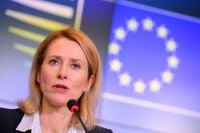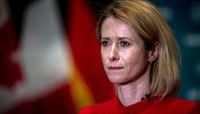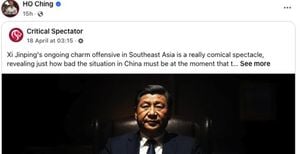Kaja Kallas, the head of the European Union's diplomacy, has issued a stern warning to the United States regarding the potential recognition of Crimea as Russian territory. Speaking in an interview with Agence France-Presse (AFP) on April 22, Kallas emphasized that such a move would not only be a mistake but would also reward Russia for its illegal annexation of the Ukrainian peninsula, which occurred in 2014.
"Then Russia clearly gets what it wants," Kallas stated, underscoring the EU's unwavering stance that Crimea is Ukrainian territory. She reiterated that the EU will never recognize the peninsula, which was seized by Russia amid widespread condemnation from the international community as a violation of international law. "Crimea is Ukraine. For those who are occupied, it is very important that others do not recognize it as Russian," she added.
Kallas's remarks come in response to reports suggesting that the United States is contemplating the recognition of Crimea as part of a broader peace deal aimed at ending the ongoing conflict in Ukraine. Earlier, Bloomberg reported that the U.S. was ready to acknowledge Russia's control over Crimea as part of negotiations, although a final decision had not been made at that time.
Further complicating the situation, The Wall Street Journal indicated that Ukraine is being asked to respond to various proposals from the Trump administration, including potential U.S. recognition of the 2014 annexation of Crimea and removing Kyiv from the list of NATO candidates. These developments have raised alarms among European leaders, who fear that conceding to Russia's demands could undermine Ukraine's sovereignty.
During the interview, Kallas urged Washington to leverage its influence to pressure Moscow instead of yielding to Kremlin demands. "They have tools in their hands to use, actually, to pressure Russia. They haven't used those tools," she pointed out, questioning why the U.S. would consider a path that might embolden Russia further.
While the U.S. has been the principal broker in peace negotiations, Europe has largely been sidelined. However, talks in Paris on April 17, 2025, marked a significant return for European diplomats at the negotiating table. During these discussions, U.S. delegates reportedly unveiled their ceasefire proposal, which is now awaiting a response from Ukraine in follow-up talks scheduled for London on April 23.
Ukrainian President Volodymyr Zelensky has already made his position clear, firmly rejecting any notion of recognizing Crimea as Russian. "There is nothing to talk about. This violates our Constitution. This is our territory, the territory of the people of Ukraine," Zelensky stated on April 22, reinforcing the Ukrainian government's commitment to reclaiming its territorial integrity.
As the situation unfolds, the stakes remain high. The potential recognition of Crimea as Russian territory could set a dangerous precedent, signaling to Russia that its aggressive actions might be rewarded rather than met with resistance. Kallas's warnings serve as a reminder of the importance of maintaining a unified front against Russian expansionism.
In her closing remarks, Kallas stressed the need for solidarity among Western allies in confronting the ongoing crisis. "We must stand together and ensure that we do not allow Russia to dictate terms that undermine the principles of sovereignty and territorial integrity that we hold dear," she concluded.
As the world watches closely, the outcome of the discussions in London could have far-reaching implications for the future of Ukraine and the broader geopolitical landscape in Eastern Europe. The commitment of the EU and its leaders to uphold Ukraine's sovereignty will be tested as negotiations progress, and the response from the U.S. will be pivotal in shaping the course of the ongoing conflict.






